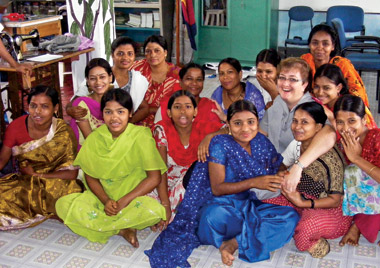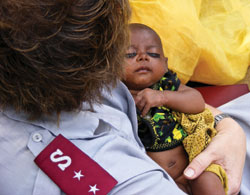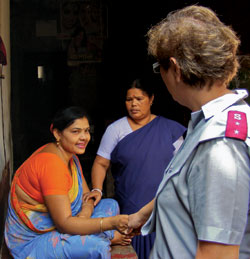 Captain Elizabeth Nelson is a Canadian Salvationist living in Bangladesh. For the past five years, she has served as the projects officer, overseeing the social work of The Salvation Army. Captain Nelson speaks with John McAlister about her ministry.
Captain Elizabeth Nelson is a Canadian Salvationist living in Bangladesh. For the past five years, she has served as the projects officer, overseeing the social work of The Salvation Army. Captain Nelson speaks with John McAlister about her ministry.
What is your role in the Bangladesh Command?
As the projects officer, I oversee all of the social work that the Army runs, such as clinics, schools and other centres. Most of my work is administrative, so I compile reports, oversee staff, write program proposals, pursue funding and attend board meetings.
What are some of the projects operated by The Salvation Army in Bangladesh?
We operate health clinics and primary schools, sponsor high school and college students, teach literacy classes and offer small loans for income-generating projects. We have two HIV/AIDS centres that specifically target women involved in prostitution. We are expanding this program to look at the issues of trafficking and addictions. We also develop community support groups, which mobilize people to look after the needs of their own communities instead of always having to rely on someone else to assist them.
 What are the significant challenges you face on a regular basis?
What are the significant challenges you face on a regular basis?
Trying to keep up-to-date with government legislation. The requirements for our various centres change frequently and it is difficult to dialogue with the various government offices. Funding is a big issue, as donors are less likely to fund service providers, such as schools and clinics, so we have to think seriously about the direction of projects and the social work of the Army in Bangladesh. If we can't find funding for a project, and if we can't generate local funding─it's very difficult to get local funding─we will need to decide the future of some of our projects.
How have you witnessed the Army helping to transform lives?
In Dhaka, we run a centre for women who are on the street. We don't advertise our services; word spreads by word of mouth. Women who have been helped by the Army tell others, “Hey, if you want a change, come over here.” The centre is open five days a week for us to help women learn how to read and write. We teach them skills and offer counselling. They learn how to manage money, and then if they want to, we can give them a loan. Some of the women buy sewing machines and others establish shops of their own.
 Many of the women have husbands who are addicted to drugs, so we are now working with the men as well. We have a program where the husbands meet once a month to talk about their addictions. And for some of the women who prepare crafts for Sally Ann International─a fair trade project─their husbands and families have started to help because the women get paid per piece. In many cases, if the husbands have something to do, they are less likely to take drugs.
Many of the women have husbands who are addicted to drugs, so we are now working with the men as well. We have a program where the husbands meet once a month to talk about their addictions. And for some of the women who prepare crafts for Sally Ann International─a fair trade project─their husbands and families have started to help because the women get paid per piece. In many cases, if the husbands have something to do, they are less likely to take drugs.
Why do the women get involved in prostitution?
Some get lost as a child when travelling with family. They are grabbed by strangers and then sold into prostitution. Others are forced into it by their families. I spoke to one girl whose father left the family when she was 13. She had multiple siblings and her mother said that she had to earn money. So, the girl was taken to a brothel. She doesn't want to be there, but realizes that in some ways she has to do it in order to help her family. Most girls and women, when they are deserted, find it very difficult to be on their own in Bangladesh. They need a brother, father or husband to serve as their protector. If they're abandoned, women and girls will do what they can, even beg. At some point, when they are hungry or desperate, they will end up in a brothel. This usually happens when they are young because young women can make more money as a prostitute.
What do Salvationists need to know about sexual trafficking?
As long as there is demand─and demand continues to go up─traffickers will continue to deceive and trap young girls and boys into a life of prostitution. The value of girls is so low that you can buy one for about $75 USD in Bangladesh. It is very easy for girls to be sold off, sent into prostitution or be trafficked.
The traffickers are so well organized that one will go to a town, court a family, marry a girl and then live with her for up to a year before saying that he needs to leave town for a job. Then he will sell the girl off in another city or across the border. It's not just a quick in-and-out job; the traffickers are quite patient at making their money and will take the time to get the girls. The police and community leaders are also involved, so it's quite a sophisticated system. In Bangladesh, it's very tough to intervene and make a difference because there are so many people involved.
 What is life like for a sexually trafficked person before and after the Army has helped them?
What is life like for a sexually trafficked person before and after the Army has helped them?
Initially, the victims are tortured, drugged and then forced to do things they don't want to do. For a lot of women, there is a strong sense of hopelessness that their lives will never change. Sexual misconduct is so looked down upon in Bangladesh, that once a woman has gone through it once, her family will probably never take her back. They can't marry her off once she is, as they would say, “tainted” or gone through this experience. So, the victim resigns herself to the belief that “this is what I have to do.” I've never found one woman who enjoys a life of prostitution. They don't want to be there. Life for them is tough, and their debt gets bigger and bigger. They have no hope that it will change.
Once the women come in contact with the Army, and specifically our staff─all of whom are Christian─they recognize that we treat them differently. They say, “You really care about us.” They learn new skills and start planning, thinking and daring to believe that life can be different.
One of our staff members is a former prostitute. For many of the women, she is an example that their situation can change. They meet her and then begin to believe that they can escape the brothels and have a life outside prostitution. We work with the women on an individual basis to discover what they want for their life. Many of them can never return to their families, so they have to think about how they can survive on their own or with a new family. Even once they've decided to make a change, it's not easy. We had one lady leave her brothel, determined to start a new life. When she got into a new community, she was harassed by men because she was single and had no husband or father to protect her. She ended up back in the brothel as she felt safer there than being out in the real world. We need to work harder to help those who make the decision to leave the brothels so that there are places for them to live where they can be safe and protected.
In Bangladesh, what changes happen in the life of a new Christian?They are persecuted and beaten. Some are removed from their family and told never to come back. The family of one of our young Salvationsts wants to kill him because he shamed the family name by converting to Christianity. At one of our corps, the families of some of the youth meet outside the church and try to disrupt the services. When members of the congregation go outside to ask them to stop, the family members beat them up.
It's not easy for a Bangladeshi to become a Christian. Some decide not to reveal it to their families in order to be protected for a while. Our churches are very good at trying to support converts if they are disowned by their own families, but it's difficult. Since most Christians come from within poor communities, churches really can't take on the financial burden of putting people through school or anything. If there is a need for support, and if we have the funds, we try to help as much as we can.
Would many of the women from the brothels convert?
In the social centre in Dhaka, we have held churches services and even had a corps spring out of the project. Many women come and ask for prayer. They know about Jesus and they've seen the Jesus Film. Some openly say that they have converted, others do not. It's hard to know. Many are probably still in the process of understanding or deciding whether to be open about their faith. We do have women who come to church and openly say that they are Christian.
Is it dangerous to be a Christian aid worker in Bangladesh?I don't think that I'm in danger. I've never feared for myself. There have been strikes and demonstrations but the hostility has never been directed towards the Army. Fundamental groups occasionally protest against certain Christian non-governmental organizations (NGOs), so you become a little more cautious at times, but I've never felt threatened. There are many NGOs in Bangladesh, and for the most part, the community people really appreciate what we are doing to help them.
What opportunities have you had to build relationships?I've appreciated the opportunity to live and work alongside the national officers and staff. They teach me a lot about culture and also about living out my faith. Even professionally, I am learning a lot from the project leaders. They have a lot of knowledge and we work well together as a team. I've been able to mentor some of the officers, which has been great. They don't have the variety of resources or experiences that we have in the West, so it's nice to share books and opportunities with them.
How has this experience influenced your faith and calling?It's definitely taught me to depend on the Lord and to strengthen my faith. It's very easy to think that you can make a difference, but sometimes when you don't have a clue what to do next, you have to trust that the Lord will show you the next step. When funding is running out and the donors are saying there's no money, you have to trust that God will guide you to new resources or to the understanding that it's time to close the project.
Living in Bangladesh has helped me to go deeper into my understanding of what it means to be a Christian. I'm tackling the issues of faith and living incarnationally day-to-day. At work, we've talked a lot lately about what it means to be salt in our community, to have an influence. It's not about preaching, but about how you respond to people and how you care for them. I want to make the most of opportunities that come my way that may seem small and insignificant, but that make a difference in people's lives. We all have a part to play and we need to live our lives the way that the Lord wants us to.
I have a stronger desire to care about women on the street. I want to make sure that they have a sense of hope. I want the Army to bring about change in their life. I'm also learning more about what it means to advocate for them and to stand up for justice issues.
I've been strengthened in my understanding of the need to develop disciples. We can't just convert people; we need to really help them learn what it means to be a follower of Christ. I want to help deepen their spiritual walk and faith, broaden their understanding of Scripture and empower them to discover what they can be doing in their own communities. A lot of churches come into communities, convert people and move on. As a result there are a lot of weak Christians and churches out there. As an Army, we need to ensure that we build each other up and develop our people so that they can make an impact in their own communities.
Top photo: Cpt Nelson visits the Dhaka counselling and development centre; second: Holding a baby during a community visit; third: Speaking to a woman in Jessore Brothel.









Leave a Comment